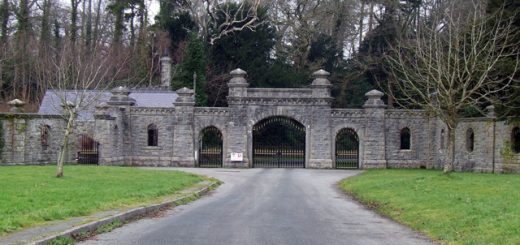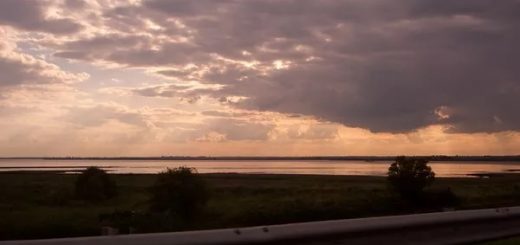Annan Castle
Annan Castle was the home of the Lords of Annandale, the de Brus family (later known as the Bruce family), before they moved to Lochmaben Castle. The move occurred after the River Annan flooded and damaged the motte and bailey castle’s foundations. The move is thought to have taken place during the time of Robert de Brus, 2nd Lord of Annandale (Born 1138 – Died 1189 or 1194) and there is a legend attached to it.
 Saint Malachy, Archbishop of Armagh (Born 1094 – Died 2 November 1148) made a request of Robert de Brus at Annan Castle that he show mercy and pardon a particular thief. Lord Robert refused and had the thief hung. As a result of this action the river is thought to have flooded and St Malachy cursed Clan Bruce.
Saint Malachy, Archbishop of Armagh (Born 1094 – Died 2 November 1148) made a request of Robert de Brus at Annan Castle that he show mercy and pardon a particular thief. Lord Robert refused and had the thief hung. As a result of this action the river is thought to have flooded and St Malachy cursed Clan Bruce.
The following account of a haunt or possible vampire case dates from the 12th century and is told by William of Newburgh (or Newbury) (Born 1136 – Died 1198), an Augustinian Canon. The story is well known but the identity of the location, Anantis Castle is a debatle. Usually the case is attributed to Alnwick and the account referred to as the Alnwick Vampire or the Vampire of Alnwick Castle. However, some people suggest that Anantis Castle may actually have been Annan Castle.
Another event, also, not unlike this, but more pernicious in its effects, happened at the castle which is called Anantis, as I have heard from an aged monk who lived in honor and authority in those parts, and who related this event as having occurred in his own presence. A certain man of evil conduct flying, through fear of his enemies or the law, out of the province of York, to the lord of the before-named castle, took up his abode there, and having cast upon a service befitting his humor, labored hard to increase rather than correct his own evil propensities. He married a wife, to his own ruin indeed, as it afterwards appeared; for, hearing certain rumors respecting her, he was vexed with the spirit of Jealousy. Anxious to ascertain the truth of these reports, he pretended to be going on a journey from which he would not return for some days; but coming back in the evening, he was privily introduced into his bedroom by a maid-servant, who was in the secret, and lay hidden on a beam overhanging, his wife’s chamber, that he might prove with his own eyes if anything were done to the dishonor of his marriage-bed. Thereupon beholding his wife in the act of fornication with a young man of the neighborhood, and in his indignation forgetful of his purpose, he fell, and was dashed heavily to the ground, near where they were lying.
The adulterer himself leaped up and escaped; but the wife, cunningly dissembling the fact, busied herself in gently raising her fallen husband from the earth. As soon as he had partially recovered, he upbraided her with her adultery, and threatened punishment; but she answering, Explain yourself, my lord, said she; you are speaking unbecomingly which must be imputed not to you, but to the sickness with which you are troubled. Being much shaken by the fall, and his whole body stupefied, he was attacked with a disease, insomuch that the man whom I have mentioned as having related these facts to me visiting him in the pious discharge of his duties, admonished him to make confession of his sins, and receive the Christian Eucharist in proper form: but as he was occupied in thinking about what had happened to him, and what his wife had said, put off the wholesome advice until the morrow – that morrow which in this world he was fated never to behold! – for the next night, destitute of Christian grace, and a prey to his well-earned misfortunes, he shared the deep slumber of death. A Christian burial, indeed, he received, though unworthy of it; but it did not much benefit him: for issuing, by the handiwork of Satan, from his grave at night-time, and pursued by a pack of dogs with horrible barkings, he wandered through the courts and around the houses while all men made fast their doors, and did not dare to go abroad on any errand whatever from the beginning of the night until the sunrise, for fear of meeting and being beaten black and blue by this vagrant monster. But those precautions were of no avail; for the atmosphere, poisoned by the vagaries of this foul carcass, filled every house with disease and death by its pestiferous breath.
Already did the town, which but a short time ago was populous, appear almost deserted; while those of its inhabitants who had escaped destruction migrated to other parts of the country, lest they too should die. The man from whose mouth I heard these things, sorrowing over this desolation of his parish, applied himself to summon a meeting of wise and religious men on that sacred day which is called Palm Sunday, in order that they might impart healthful counsel in so great a dilemma, and refresh the spirits of the miserable remnant of the people with consolation, however imperfect. Having delivered a discourse to the inhabitants, after the solemn ceremonies of the holy day had been properly performed, he invited his clerical guests, together with the other persons of honor who were present, to his table. While they were thus banqueting, two young men (brothers), who had lost their father by this plague, mutually encouraging one another, said, This monster has already destroyed our father, and will speedily destroy us also, unless we take steps to prevent it. Let us, therefore, do some bold action which will at once ensure our own safety and revenge our father’s death. There is no one to hinder us; for in the priest’s house a feast is in progress, and the whole town is as silent as if deserted. Let us dig up this baneful pest, and burn it with fire.
Thereupon snatching up a spade of but indifferent sharpness of edge, and hastening to the cemetery, they began to dig; and whilst they were thinking that they would have to dig to a greater depth, they suddenly, before much of the earth had been removed, laid bare the corpse, swollen to an enormous corpulence, with its countenance beyond measure turgid and suffused with blood; while the napkin in which it had been wrapped appeared nearly torn to pieces. The young men, however, spurred on by wrath, feared not, and inflicted a wound upon the senseless carcass, out of which incontinently flowed such a stream of blood, that it might have been taken for a leech filled with the blood of many persons. Then, dragging it beyond the village, they speedily constructed a funeral pile; and upon one of them saying that the pestilential body would not burn unless its heart were torn out, the other laid open its side by repeated blows of the blunted spade, and, thrusting in his hand, dragged out the accursed heart. This being torn piecemeal, and the body now consigned to the flames, it was announced to the guests what was going on, who, running thither, enabled themselves to testify henceforth to the circumstances. When that infernal hell-hound had thus been destroyed, the pestilence which was rife among the people ceased, as if the air, which had been corrupted by the contagious motions of the dreadful corpse, were already purified by the fire which had consumed it. These facts having been thus expounded, let us return to the regular thread of history.




Recent Comments